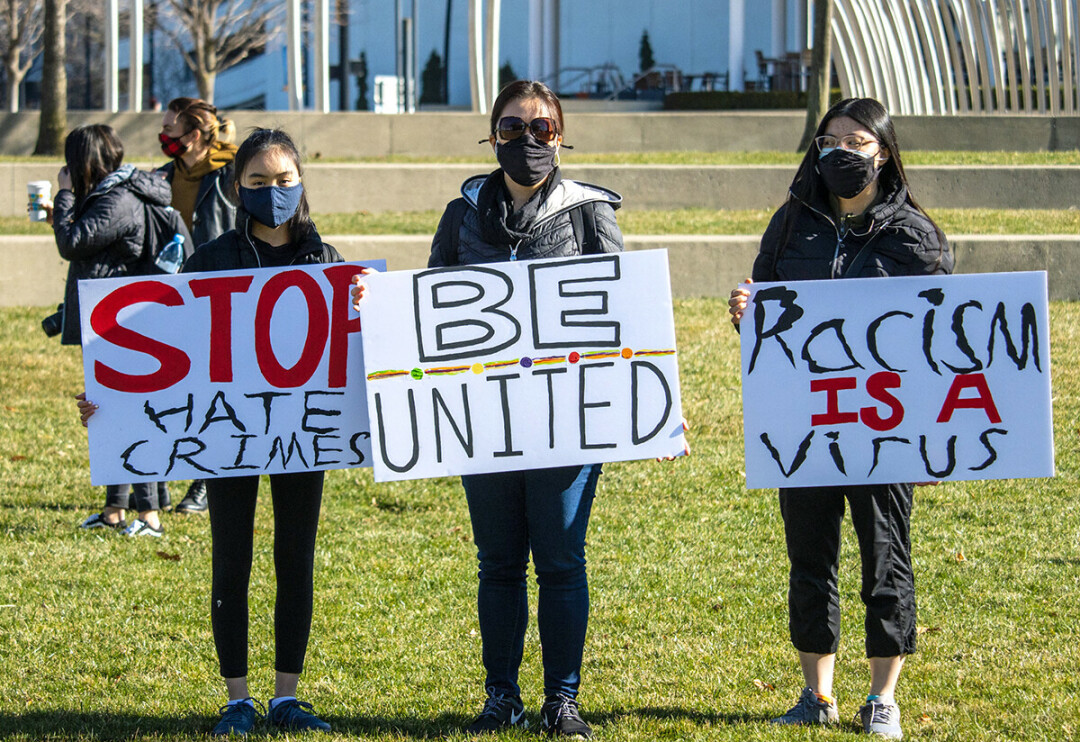‘Perpetually Foreign’: Reflecting on the Latest Rise in Anti-Asian Violence
Her parents raised her to be a fist, full of strength and resistance. But how long can you hold a fist?
Yia Lor |

I often forget that my citizenship is conditional until a crisis occurs involving the HMoob* community or an Asian nation. For this reason, my parents raised me to be a fist, full of strength and resistance. In a world that doesn’t always want you, the fist is what survives a war you didn’t start. It gets you through having to bury your first child in a refugee camp, and it allows you to stand your ground when the man behind you says you are stealing jobs that are rightfully his and to go back to your own country.
The days following the Atlanta spa shootings, I received messages from friends checking in and letting me know they were here if I needed anything. Overwhelmed with too many emotions, I retreated to my parents’ garden in the countryside. On more than one occasion, I’ve made a trip out there without them knowing so I could sit alone with the maple trees and my troubles.
On this particular day, my troubles and I found my father raking the last of the tree branches that had fallen into the garden while my mother waited impatiently. They were in a standoff. My father had promised a few weeks earlier that he would take my mother hiking. It was a warm start to spring with temperatures reaching just over 60 degrees, and my mother thought it was perfect for their first hike of the season.
”
The world is full of hatred, my father said. For people who look like us, nowhere is safe.
My father disagreed. Today, tomorrow, and until further notice, they would not go hiking. The world is full of hatred, my father said. For people who look like us, nowhere is safe. Needless to say, my parents did not go hiking that day, and I returned home with my troubles.
According to the most recent report from Stop AAPI Hate, there have been almost 3,800 reports of hate incidents in the U.S. since the start of the pandemic. However, the history of anti-Asian sentiment begins long before the pandemic. There was the lynching of 18 Chinese men and boys in 1871, the Japanese internment camps, and the murder of Vincent Chin, to name a few. Lessons keep presenting themselves until they are learned, and it seems we struggle to understand what happens when we reduce someone’s humanity.
On the day that my parents did not go hiking, my nieces wanted to play at the park. Remembering my father’s words, we had purposely chosen a quieter-than-usual location. As I watched my nieces go down the giant slide together and chase each other in a game of tag, I couldn’t help but wonder if their little fists could survive being seen as perpetually foreign. How would they respond when their favorite teacher tells the class that all Asians look the same? What will they do when their boss says he thinks all HMoob men are abusers? Can the fist survive someone else’s bad day? The trees didn’t answer.
I think of the many fists that have been raised throughout the Black Lives Matter movement and what anti-Asian violence means at this point in our history. Though I am not White, I am also not Black, and being not-Black has allowed me privileges that are denied to many Black people. When a tragedy occurs such as the spa shootings, how can we relate this back to the Black community’s struggle for freedom and the hate that targets them relentlessly? Instead of falling back on an anti-Blackness system that has served some more than others and comes with complicity to white supremacy, how are we advocating for a structural transformation that allows protection for everyone? These are the questions I challenge myself, my family, and my community.
Yia Lor is a storyteller and writer from Eau Claire. She shares her time with her family, her yoga mat, and 30+ houseplants.
* The term “HMoob” is used instead of the anglicized term “Hmong” to reclaim the term that defines this ethnic group. The “h” and “m” are capitalized to be inclusive of White Hmoob and Green Moob.






















